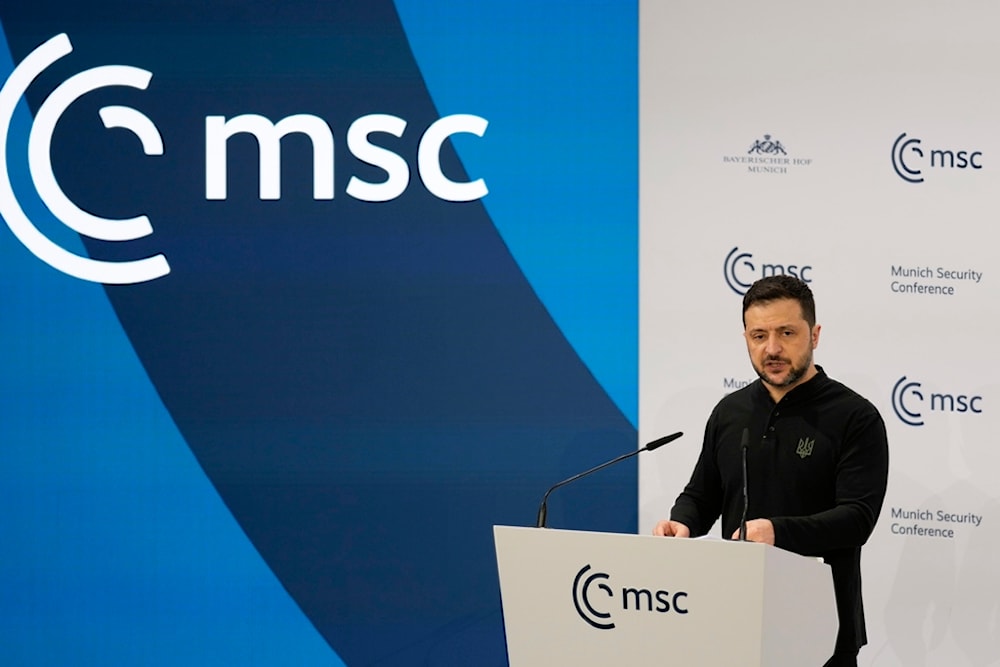Zelensky proposes alternative security alliance amid NATO uncertainty
The Ukrainian leader urged the European Union to strengthen its own security mechanisms instead of relying on US protection, warning that Europe's future is in its own hands.
-

Ukraine's President Volodymyr Zelensky speaks during the Munich Security Conference at the Bayerischer Hof Hotel in Munich, Germany, Saturday, Feb. 15, 2025 (AP Photo/Matthias Schrader)
Ukrainian President Volodymyr Zelensky has reaffirmed his commitment to securing NATO membership for Ukraine but acknowledged the lack of a clear path to joining the alliance. Speaking at the Munich Security Conference on Saturday, he suggested the creation of a new security bloc stretching across Eastern Europe as a potential alternative.
"We are talking about security guarantees, and that is why we believe that the core of any security guarantees for Ukraine must be NATO membership or if not that, then conditions that allow us to build another NATO, right here in Ukraine. Because at some point there will be a border between war and peace, where that border is drawn and how strong it is, is up to us," Zelensky stated.
Ukraine's bid for NATO membership dates back to 1994, when it joined NATO's Partnership for Peace program. This relationship deepened in 2002 with the NATO-Ukraine Action Plan, but in 2010, under President Viktor Yanukovych, Ukraine adopted a policy of non-alignment. Following Russia's annexation of Crimea in 2014, Kiev reversed course, declaring NATO membership a strategic goal in 2017, which was later enshrined in its constitution in 2019. However, NATO has yet to provide a concrete timeline for accession.
Zelensky's Pivot
At Munich, Zelensky acknowledged this impasse, stressing the need to establish an alternative security structure that would encompass eastern Ukraine, Belarus, the Baltic states, and Finland, forming a hostile line against Russia.
The Ukrainian leader also urged the European Union to strengthen its own security mechanisms instead of relying on US protection, warning that Europe's future is in its own hands. His remarks reflect growing concerns across the continent about Washington's commitment to NATO, particularly under the leadership of President Donald Trump and Vice President JD Vance, both of whom have questioned the alliance's importance.
Speaking at the same conference on Friday, Vance argued that Europe's current crisis is largely of its own making, rather than being driven by Russia or China. He pointed to political instability, highlighting the annulment of Romania's election results and fears of a similar scenario in Germany.
Read more: 'New sheriff in town': Vice President JD Vance says in Europe
Meanwhile, Trump dismissed the possibility of Ukraine joining NATO, calling it "stupid" for former President Joe Biden to claim that it could happen, given Russia's strong opposition. US Defense Secretary Pete Hegseth reinforced this stance, stating that Ukraine's accession to NATO is not seen as a viable outcome in any potential negotiations with Moscow.
Amid these geopolitical shifts, European leaders are increasingly pushing for greater strategic autonomy. Zelensky's proposal to establish a security alliance within Eastern Europe is in line with this growing movement, as regional anxiety rises over US foreign policy unpredictability and the need for self-reliant defense initiatives.

 3 Min Read
3 Min Read









